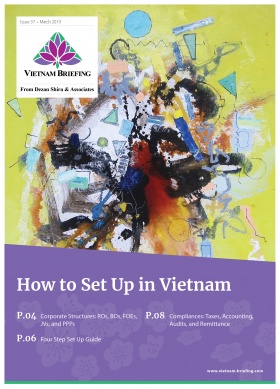Representative Office Dissolution Part 2: Tax Documentation
In part two of this three-part series, we outline practical recommendations on how ROs can enhance their current tax documentation as well as mitigate future potential tax risks when shutting down.
Traveling expenses for employees
Costs of business trips are almost unavoidable for ROs operating in Vietnam due to the need to send their employees for meeting with potential business partners, training with the parent company overseas or seeking potential locations for future investment.
It is common to see ROs incur significant business travel costs during their operational periods in Vietnam and then be penalized for additional taxes, which are imposed on such expenses after being audited by the tax authority.
Due to this, several investors believe that the tax authorities do not allow ROs to incur travel expenses. However, travel expenses should be exempted from PIT if the RO can validate that such expenses are necessary for its business development.
Similar to a company’s accounting documentation to support deductible expenses, an RO is required to maintain adequate bookkeeping records as well as supporting documents of business traveling expenses.
To justify the direct relationship between the travel expenses incurred and the RO’s operation activities, the following supporting documents should be sufficiently maintained:
- The policy for business travel must be specified in the RO’s internal financial regulations, collective labor agreement or employment contracts with their employees. Such a policy should cover the detailed limitation of costs, travel duration, and purposes as well as approval and payments approach (direct payments or reimbursement of actual expenses);
- If the RO provides fixed allowances and per diem for their employees’ business trip, such provisions must also be stipulated in the travel policy as well;
- Assignment letter with details of duration, locations, and purpose of the business trip;
- An e-ticket (online reservation) or tax invoices (booking through flight agencies) and boarding pass;
- Legitimate tax invoices or receipts of accommodations, cab fares and other miscellaneous expenses incurred during the trip; and
- Payment documents.
During a tax audit for RO dissolution, the tax officers tend to challenge business travel costs without adequate supporting documents or clear conditions on the RO’s business travel policy.
In addition, it should also be noted that the business travel costs might be deemed as employees’ taxable benefits if the RO fails to establish a connection between such expenses and the need for the RO’s operations.
In this regard, it’s recommended that an itinerary specifying the employees’ work details during the trip should also be included as part of supporting documents for business travel expenses. A detailed itinerary is not regulatorily required, but it is helpful for providing an adequate explanation in future tax audits.
Annual vacations for employees’ family members
It is common for Vietnamese organizations, including ROs to provide their employees with annual vacations as part of their benefits packages.
Occasionally, as a reward for their employees after a successful and productive year, the ROs may invite family members of those employees to join the annual company trip and cover all costs. However, businesses must be aware of the added tax implications.
Annual vacations are typically not counted toward the employees’ assessable income for PIT declaration purposes, given that such benefit entitlements are specified in the RO’s internal policy or employment contracts. It is important that supporting documents are maintained and payments are made for the organization’s employees as a whole rather than to a specific individual.
If the benefit entitlements are inclusive of the employees’ family members then the case differs.
For tax authorities, family members are not directly related to the RO’s daily operations and as such, any payments to them are treated as additional taxable benefits-in-kind to the RO’s employees and must be taxed accordingly.
Therefore, the ROs are recommended to carry out appropriate tax withholdings and declaration when making benefit payments, which are inclusive of their employees’ family members, to avoid the imposition of additional tax and corresponding penalties during future tax audits.
Cash-in-lieu of benefits payments
There are several occasions where the employees, due to personal reasons, are unable or refuse to use the benefits that is offered by the RO as mutually agreed. The benefits might include but are not limited to annual vacations, educational courses, or life insurance. The RO, as a gesture of goodwill, makes cash-in-lieu of benefits payments for those employees should they choose to do so.
While such benefits for employees are tax-exempt in most circumstances, cash-in-lieu of benefits payments are not. Under PIT regulations, cash-in-lieu of benefits payments are considered as employees’ assessable income.
Therefore, the RO must make appropriate tax withholdings or have such payments counted toward the employees’ assessable income for PIT declaration purposes, depending on the mutually agreed PIT filing arrangements.
Traveling expenses for family members of expatriates
Most expatriate employees working for a RO in Vietnam are entitled to the benefits of complimentary visa fees and round-trip airfares. Given that certain conditions are met, the costs to return home of expatriate employees are tax-exempted and do not count toward their assessable income under PIT regulations.
In some instances, the family members of such employees are also covered for their traveling expenses under the internal policy of the RO or its parent company. As such, any benefit entitlements of employees, which are inclusive of their family members, should be treated as additional taxable benefits-in-kind to the RO’s employees and taxed.
Based on our experience, there have been cases where benefit payments have been accumulated up to a significant amount after a few years of operation without adequate tax withholdings and declaration. Consequently, these are all subject to the tax authority’s challenges resulting in additional tax and penalty amounts during a tax audit.
About Us
Vietnam Briefing is produced by Dezan Shira & Associates. The firm assists foreign investors throughout Asia from offices across the world, including in Hanoi and Ho Chi Minh City. Readers may write to vietnam@dezshira.com for more support on doing business in Vietnam.
- Previous Article Representative Office Dissolution Part 1: Tax Compliance Challenges
- Next Article Representative Office Dissolution Part 3: Documenting Expenses







